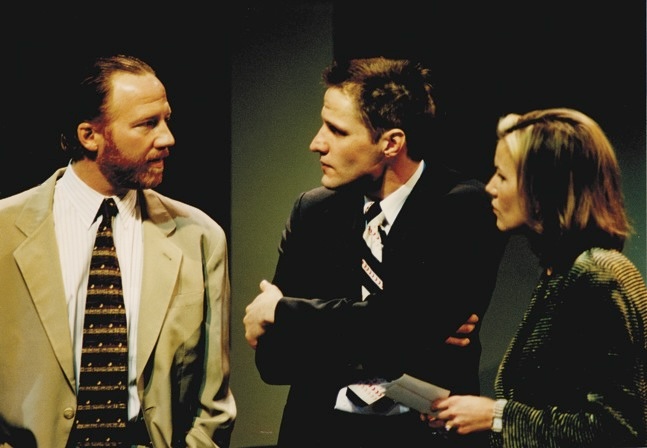Q&A with Timothy Busfield
This fortysomething Thirtysomething star and longtime Sacramentan now stars in NBC’s critical hit Studio 60 on the Sunset Strip as Cal Shanley, the director of an SNL-like show. But he doesn’t just play a director on TV; he’s one in real life too (Studio 60, Las Vegas). Not to mention, he’s also a big-time producer (Ed, Without a Trace). TV’s most unassuming triple threat talks to Sactown about his new show, B Street’s identity crisis, and laptop shopping with Studio 60 creator and writer Aaron Sorkin on Arden Way.
What was your first thought when you found out that NBC picked up Studio 60 for a full year? Things were a little dicey for a while there.
I thought, “I could complete the work on my deck!” That was seriously the first thing I said to my wife: “Let the contractor know to keep going on the deck.” We’d bought a house up in the hills above Malibu, and we were stuck at the halfway point [on the deck]. When you’re an actor, director or producer, it’s so inconsistent. Everything around here waits—new shoes wait, Christmas waits. It’s tough to keep a show on the air long enough to give it a shot these days. This is a doggone good show. It takes most shows 10 or 12 [episodes] before the writer either finds the who’s who and what’s what of what he wants the show to be. And then year three on a series, I don’t know why, but I’ve observed that most shows seem to mimic themselves in some way.
So it takes about thirtysomething episodes before that happens.
There you go! It takes about thirtysomething episodes. The writers relax a little bit, but then they usually pick it up again. I’ve told the other actors, Aaron is just clearing his throat. And sure enough, the scripts that are going to air, I think, are just infinitely superior. Well, I shouldn’t say “infinitely,” because he’s the best writer in the world, so I don’t know how you can be infinitely superior on top of that. I don’t know the specifics, but you’ll see fewer storylines that may not work and fewer characters that don’t have impact.
And your character Cal Shanley, what is his role in this show? He seems pretty grounded whereas everyone else is frenetic.
When I got into Cal, I said, “This is an emotionally healthy guy with a healthy family life, who is not part of the actor world.” We took a very blue-collar approach to him, that he’s a crewmember who probably started as a grip 20 years ago and worked his way up. Part of that is probably Aaron’s painting of me, that I’m more that guy than the movie-star guy.
People might be surprised to learn that you direct some episodes too. How do you juggle the two?
Here’s how you do it: You produce 100 plays in 15 years. I swear to God, I learned it when I started those two theaters [B Street and Fantasy Theatre] up there. I acted in a great deal of those plays and co-wrote a lot of the children’s plays, so I was wearing a lot of hats then. There were times before entrances, as the lights were going down, that I would be there with paper towels wiping up the floor of the ladies’ bathroom for intermission. During the play, if I had a minute to kill, I’d make sure the bar was stocked. So just being an actor down here wouldn’t be enough really.
Any B Street experiences that stand out in your mind?
I’d say the most memorable theater experience was the one with my wife Jenny: National Anthems with Jenny, me and Kurt Johnson [in 1995]. My wife played my wife in the play, and she had never acted before. And Kurt was just great in it. He’s one of my favorite actors in the world. I mean, I recruited the kid out of college—I really can’t get enough of Kurt. We got such nice reviews. Also, a lot of those children’s plays the first three or four years [stand out], like Fantasy Americana, the story of Blackbeard the Pirate. I remember seeing the kids. I get teary now thinking about it, but I’d look and I’d see 400 kids in their seats, and every one of them would be glued to the stage and laughing. That’s a mitzvah. The [arts] are drying up because kids aren’t seeing it. They can’t all of a sudden [grow up] and discover the theater, the opera, the symphony. I want all the arts to grow by having kids trust it, with outreach to the schools. We’re reaching over 100,000 kids a year at the Theatre. I don’t think I was very much fun for the arts commission when I was [in Sacramento]. I would be brutal, and they would stare at me with their mouths open like, “What a dick!”

From left: Timothy Busfield, Kurt Johnson and Jennifer Busfield in National Anthems (Photo courtesy of B Street Theatre)
Hey, didn’t Aaron Sorkin debut a play at the B Street?
Not only did he debut it, but he acted in it! His Hidden in this Picture was the second play we ever did. I put him up at the Clarion and he spent four months there. We hung out at Harlow’s. We went and got computers together over at a little Apple place by Arden Fair. That was his first laptop. He wrote some movies, like Malice, and did over 70 performances for the play. It was a big hit, a massive moneymaker for us early on. He was brilliant. People would call the theater and make sure he was going on. They didn’t care if I was going on, but they cared about him.
How did you meet Aaron Sorkin?
In 1990, I auditioned for A Few Good Men [on Broadway]. I played Lieutenant Kaffee, the Tom Cruise part. I’m so lucky. Aaron is very loyal. He’s one of two people writing letters for my daughter applying to Brown and Cornell. I would say that with Aaron, it’s like being a violinist for Mozart. You get the music, and you know what he wants. You know when he wants it soft and when he wants it stupid.
B Street is planning to move, right?
B Street is trying to take over a piece of property next to Café Bernardo [on Capitol between 27th & 28th Streets]. It’s owned by Sutter. There’s a lot of red tape involved, and it’s a big deal to construct anything downtown anywhere, especially in the state capital of California.
But your theater’s name is B Street because it’s on B Street. So what happens?
I think it’ll still be the B Street Theatre. B Street, that was the stupidest thing anyway. We needed a logo, so I walked outside, saw the B St. street sign, and said, “We’ll be the B Street Theatre.” I walked back inside and drew the “B” and the Lucky Strike circle—that’s all I could think of. But then we opened the B Street Theatre only to find out that the only part of B Street is our block—our driveway is it—and you can’t get to it except through C Street. There’s a B Street down [by Alhambra], but it doesn’t really come up. Nobody could find us!
And the trains ran by the theater back then too, right?
Oh, yeah. We didn’t mind. When you’re out there [on stage], you can tell if it’s an Amtrak train or something that’s going to buckle. If it’s Amtrak, you can wait for the laughs, you can slow things down, because it’ll speed by. But if it’s a slow-moving freight train that’s going to stop right there for like 10 minutes, you know you have to get important information out now. Usually in rehearsal, I’d prep [the actors] and say, “Hey, heads up. If all of a sudden, I start talking really fast, [that means] I’m getting information out before that train.”
Your and your brother Buck’s theater company has come a long way in 20 years.
Buck is doing a fantastic job. It’s still going strong. I had started a theater in Tennessee with a buddy of mine in 1978. It folded, and I said, “I’m never going to let that happen again.” There were times I had to go door to door [for Fantasy Theatre] and got 10 bucks. I had my kid with me, I had to make payroll, and I just didn’t have the money. I would say, “I’m starting a nonprofit theater for children and I’m looking for donations. It’s a write-off…” And bang! The door would shut.
But didn’t anyone recognize you?
Some might have, but they probably thought it was too freakish: “Why would that guy be at my door?” And they wouldn’t believe it. Anyway, [our organization] is doing exactly what I wanted it to do. We’re reaching over 170,000 people a year with professional theater. I’m trying to assemble the right people for this thing I’m calling The American Educational Regional Outreach. I want 30 B Street Fantasy Children’s Theatre of Californias across the nation.
Any chance we might see you on the B Street stage again?
I don’t see myself acting at the B Street at this time. Only because [my job] is all-consuming. I’ve been averaging 70-hour weeks.
Do you still come visit?
Oh yeah, are you kidding? I was just up there a couple of weeks ago. All of Jenny’s and my family are in Sacramento. And there is a place called Shorty’s La Amistad Cafe in Clarksburg. It’s all I ever hanker for all the time. The pork special—the pork molé with rice and beans—is the best food in Sacramento. And their tortillas are the best in all of Northern California. On a Saturday morning, go and have a couple of eggs, bacon, tortillas, and rice and beans, and you will go crazy. You have to check it out. It’s beautiful out there too.



